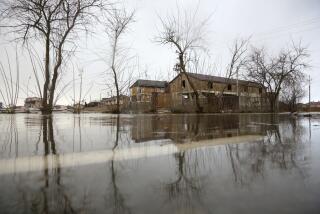Cholera Epidemic in Russia Spreads to Crimea; 4 Dead : Health: More cases are expected. Infectious diseases flourishing in former U.S.S.R. as living standards fall.
MOSCOW — The cholera epidemic that has been ravaging southern Russia has spread to Crimea, killing four people and infecting 58 others, public health officials said Monday.
The outbreak in Crimea, a Black Sea peninsula that is an autonomous region within Ukraine, came just as Russian public health authorities were declaring that the epidemic that killed 15 people in Dagestan and infected at least 1,000 others was finally subsiding. “We thought it was under control, and suddenly again you have an outbreak,” said Loreta Colatosti of the World Health Organization in Copenhagen.
Crimean public health chief Boris Lezhentsev told the Itar-Tass news agency that he expects the epidemic to worsen because of an acute water shortage, a heat wave and generally poor sanitation.
Crimea, a subtropical vacation spot, has suffered a sharp economic decline and chronic political instability over the past three years as the ethnic Russian population has attempted to separate from Ukraine and rejoin Russia.
In the Crimean capital of Simferopol, markets were shut Monday, streets were cleaned and hospital beds were being readied, Itar-Tass reported.
Infectious diseases of all sorts have flourished in the former Soviet Union as living standards here have declined. The number of diphtheria cases jumped this year in nearly all of the former Soviet republics, except Estonia, which reported no incidents, WHO reports.
Russia reported 15,229 diphtheria cases in 1993, but registered 14,334 cases in the first seven months of 1994, the data show.
Azerbaijan has had a tenfold increase in measles, Uzbekistan suffered an outbreak of polio and typhoid fever has reappeared in Russia. Tuberculosis and syphilis are widespread, and the incidence of such children’s diseases as whooping cough and German measles has increased sharply.
This summer also brought outbreaks of anthrax from infected cattle, fatal salmonella poisoning from contaminated food and leptospirosis from rodent-contaminated meat, according to Russian news reports.
The cholera epidemic is blamed on the new freedom to travel and contract the disease abroad, as well as inadequate treatment of water and sewage that helps spread the bacteria at home. “Cholera is a disease of poverty,” said Dr. Maria Neira of WHO in Geneva. “If you don’t have hygienic conditions and minimal public health standards, the vibrio (bacteria) can spread very quickly. . . . In the former Soviet Union, the health infrastructure is now broken.”
This summer, cholera has struck in Russia, Moldova, Ukraine and Belarus. Four deaths have been reported in the breakaway southern Russian republic of Chechnya, though there is no official confirmation.
Russia has no problem treating cholera patients once they are hospitalized, and even in underdeveloped Dagestan there is no shortage of medicine, said Mikhail I. Narkeyevich of the Russian Ministry of Health. The last death in Dagestan occurred nearly a month ago, and few new cases are appearing, raising hopes that the epidemic there is at last under control, he said.
More to Read
Sign up for Essential California
The most important California stories and recommendations in your inbox every morning.
You may occasionally receive promotional content from the Los Angeles Times.










